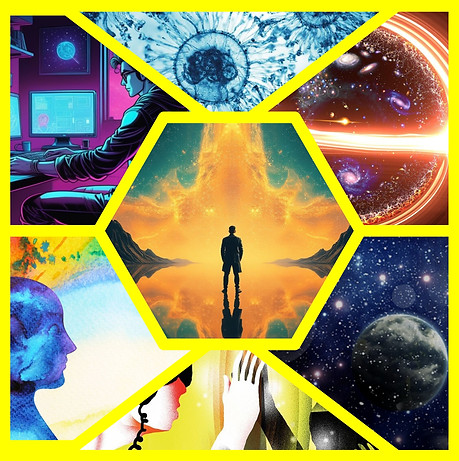FREE THINKING:
EXPLORE THE REALMS OF KNOWLEDGE
Aliens and the Matrix


Simulated Minds and Alien Possibilities: A Critical Reflection
Are we alone in the universe—or merely alone in our simulation?
The search for extraterrestrial life often divides into two categories: microbial existence and intelligent consciousness. While the existence of bacteria-like organisms on distant planets seems plausible, the question of intelligent life remains far more elusive. Astrobiologists suggest that microbial life may be abundant, but intelligent civilisations could be vanishingly rare. Carl Sagan once warned that “absence of evidence is not evidence of absence,” yet the silence of the cosmos continues to provoke philosophical unease.
One explanation is the Great Filter hypothesis: perhaps intelligent life tends to self-destruct before achieving interstellar communication. Physicist Brian Cox has speculated that technological advancement may carry inherent risks that civilisations fail to survive. If so, the universe may be littered with the ruins of once-promising species.
But what if the real mystery isn’t out there, but within?
Simulation theory proposes that our reality may be an artificial construct. Philosopher David Chalmers argues that if consciousness can emerge from computation, then simulated beings might possess genuine awareness. Nick Bostrom’s simulation argument suggests that if advanced civilisations run ancestor simulations, the odds favour us being inside one.
This raises profound questions: Can consciousness exist within a digital framework? Roger Penrose and Stuart Hameroff’s Orch-OR theory posits that consciousness arises from quantum processes, potentially embedded in the very structure of reality. If consciousness is not merely emergent but fundamental, then simulated minds might be as “real” as biological ones.
The idea of a cosmic programmer—whether divine or algorithmic—enters the conversation. Some thinkers liken this to Spinoza’s pantheism, where God is synonymous with the laws of nature. Others invoke Teilhard de Chardin’s Omega Point, a vision of the universe evolving toward a state of unified consciousness. The suggestion that our universe could be nested within a black hole, or one of many in a multiverse, adds further layers of metaphysical intrigue.
Traditional assumptions about life are also challenged. Why search only for carbon-based organisms? As physicist Paul Davies notes, life could be based on silicon, ammonia, or even plasma. The emergence of artificial intelligence raises another possibility: could AI become a form of non-biological intelligence, perhaps even extraterrestrial in origin or potential?
These speculations are not idle fantasies—they reflect a growing recognition that our understanding of life, mind, and reality is deeply limited. The anthropocentric view that humanity is the pinnacle of evolution is increasingly untenable. As we probe the cosmos and simulate worlds within our machines, we must confront the possibility that we are not the authors of reality, but its artefacts.
In a universe possibly teeming with simulations, black holes, and post-biological minds, perhaps the most radical act is to live as if we matter. To treat our planet not as a disposable backdrop, but as a singular, finite entity deserving reverence.
As philosopher Thomas Nagel asked, “What is it like to be a bat?” Today, we might ask: What is it like to be a simulation, wondering if it’s real?
